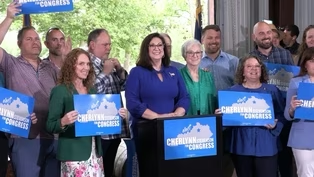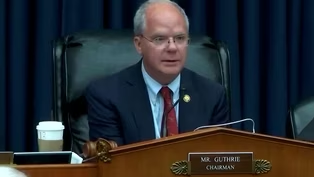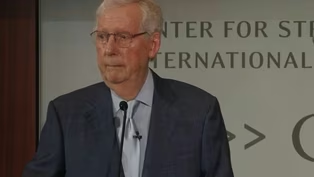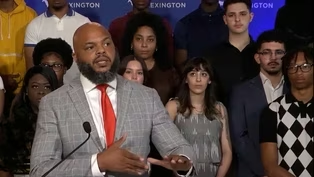
How Nation's Founding Father Influenced KY's Constitution
Clip: Season 3 Episode 249 | 9m 24sVideo has Closed Captions
Denis Fleming's book about Thomas Jefferson has earned him credit as a constitutional scholar.
It's a lesson in history that few know. Denis Fleming is a long-time attorney and political operative in Kentucky. In his first book, Thomas Jefferson and the Kentucky Constitution, focuses on how the nation's founding father Thomas Jefferson had a major influence on Kentucky's constitution of 1792.
Problems playing video? | Closed Captioning Feedback
Problems playing video? | Closed Captioning Feedback
Kentucky Edition is a local public television program presented by KET

How Nation's Founding Father Influenced KY's Constitution
Clip: Season 3 Episode 249 | 9m 24sVideo has Closed Captions
It's a lesson in history that few know. Denis Fleming is a long-time attorney and political operative in Kentucky. In his first book, Thomas Jefferson and the Kentucky Constitution, focuses on how the nation's founding father Thomas Jefferson had a major influence on Kentucky's constitution of 1792.
Problems playing video? | Closed Captioning Feedback
How to Watch Kentucky Edition
Kentucky Edition is available to stream on pbs.org and the free PBS App, available on iPhone, Apple TV, Android TV, Android smartphones, Amazon Fire TV, Amazon Fire Tablet, Roku, Samsung Smart TV, and Vizio.
Providing Support for PBS.org
Learn Moreabout PBS online sponsorshipIt's a lesson in history that few know about.
One longtime attorney and political operative set out on a mission to find how the nation's founding father, Thomas Jefferson, had a major influence on Kentucky's Constitution of 1792, secretly writing some controversial state resolutions.
Dennis Fleming worked in Kentucky state government as general counsel for three governors, served as chief deputy attorney general, and congressional chief of staff.
His first book, Thomas Jefferson and the Kentucky Constitution, has now earned him credit as a constitutional scholar.
Several chapters in the book detail Kentucky's opposition to the Alien Enemies and Sedition Acts of the late 18th century, and this feature on books and authors.
Turning the page.
Dennis Fleming connects our past and present.
Dennis Fleming, it's good to see you.
So good to see you.
Long time.
It has been a few years for our viewing audience to know who you are.
I think, well, that name kind of sounds familiar.
And does he have a brother who is in the Kentucky General Assembly right now?
I sure do.
I have a daughter that worked for, leader McConnell.
We have a family full of folks that have been involved in politics.
And you yourself.
I was for 23 years.
I was in public service now.
This was sandwiched between private practice in Louisville and throughout Kentucky, and in my last eight years have been in the health care sector, but for 23 years, 14 of which I was in Frankfort, I was first in the Wilkins administration, in the economic development cabinet.
I worked with Jeff Noel, who is now the Secretary of Economic Development, right.
And worked under Governor Wilkinson.
And then later I worked with Governor Petraeus, his general counsel, deputy secretary of his cabinet.
And then for about a year and a half, with Greg Stumbo as the chief deputy attorney general.
And then Ben Chandler ran for governor, lost and had coffee with me one day and said, you know, I'm thinking about running for Congress.
I said, oh, my gosh, I don't know if we can win that.
He says, I bet we can.
And sure enough, he won it.
And I went.
And I was his chief of staff for eight and a half years in Washington.
Right.
It's been an interesting your family's pretty political.
Your brother is a Republican.
He's a Republican.
Yes.
He's been a member of the General Assembly.
I think he's in his third term.
But before that, for 12 years, I believe it was 12, maybe more.
He was a member of, the Louisville Metro Council.
Right.
So, yeah, I've always been plugged in.
Oh my gosh.
Yeah.
Well, time to pass it on to our kids.
That's right.
And to add to all the things you are the the person, Cheryl Snyder, who wrote the foreword to the book, calls you a constitutional scholar.
I couldn't.
Can you believe it?
Yeah.
Do you do you agree or disagree?
Well, when I wrote this book about ten months ago, I never dreamed the Alien Sedition Acts would have any modern day where we'd be saying it like we say everyday life now.
It's like in the news.
It was in the paper.
I was driving up here and it was on NPR just now, on an hour long special about the alien Enemies Act and the Alien Enemies Act was a component of the Alien and Sedition Acts that were passed by Congress at the request of President Adams in 1798.
Now, the reason the acts were passed, we were in a developing war with France, and France had begun to attack some of our merchant shipping in the Caribbean, which is important to Kentucky because so many goods came up through New Orleans, the port of New Orleans, and up through Mississippi.
And we took the position that because we owe France so much money after the Revolutionary War, $5 million, which is about a quarter of our national budget, that we wanted to renegotiate that payment.
And Louis the 16th had just been deposed, which Louisville is named after, and a new government was in place.
So we sent a group over there to negotiate a new payment system.
They unfortunately asked for a bribe of $1 million.
And our folks left and came back and told Congress and President Adams and our ships were continuing to be taxed.
So Adams, some people think, overreacted.
But he put the nation on a war footing.
He passed a national property tax.
He raised an army of 20,000 folks.
He developed a capital shipbuilding program.
But in that climate, he had Congress pass the Alien and Sedition Acts, part of which will raise from five years to 14 years, the time it took to become a citizen.
It declared any criticism of the president to be illegal.
He couldn't criticize Congress.
That angered Jefferson because he was such a first Amendment advocate.
But it also called for the deportation of illegal aliens, people that were against the interests of the country and that had engaged in predatory incursions or invasions, and were against what the nation wanted to accomplish in the face of what they thought was a developing war.
I mean, we were on a real war footing, but Kentucky had a different reaction to all of that.
Kentucky had a lot of affinity for France.
So what happened was Governor Garrett was upset.
He wrote President Adams and said Kentucky's in a state of insurrection.
He said, if not completely.
He said, disaffected with what's going on in the national government, we you really need to rethink this policy.
So Jefferson, who was vice president at the time, secretly wrote the Kentucky Resolutions and gave them to John Breckenridge and Dumas Malone, the great biographer of Thomas Jefferson, who wrote the six volume biography, speculated and come pretty close to proving that Wilson Carey, Nicholas was the Go-Between between Jefferson and Breckenridge and getting these resolutions to Kentucky.
Breckenridge was then in the General Assembly.
They passed within two days after a bunch of speeches unanimously, and they basically declared that Kentucky wasn't going to abide by the Alien Sedition Act, particularly the Alien Enemy Act, where we didn't want anybody to be deported.
We thought it was disruptive.
And so we declared a state of nullification as it relates to those acts, and decided we weren't going to abide by the law.
Now, the same thing passed in Virginia that Jefferson wrote, but most of the rest of the nation was supportive of what was going on nationally.
Fortunately, the Sedition Acts died sort of a natural death.
They were never implemented.
I argue in the book that this was a prelude to the Louisiana Purchase, where we got on much better terms with France and Jefferson.
It was a big issue, though, with the election of 1800.
Adams tried to run again and Jefferson won.
And then he put our Kentuckian, John Breckenridge, who was a U.S. senator, as the attorney general.
And just before he took the job as attorney general, he spearheaded the Louisiana Purchase, which was a huge addition of hundreds of thousands of acres miles in 15 new states and really helped develop the westward expansion of the country.
So how do you contextualize what we hear happening and see happening when it comes to deportations and the incitement of, or reflection on, the aliens enemies act now?
I mean, how do you put all of that into context?
You know what mean?
Out of context?
Yeah.
And you know, what's remarkable is the very same language that was in the statute as it's passed is still there today.
That's the only part of the Alien and Sedition Acts that's still alive and on the books.
And that calls for or permits the deportation of individuals that are illegal aliens that are deemed to have engaged in an invasion or predatory incursions.
Now the courts have struggled with that.
There was a Texas federal court just a few weeks ago that said it was illegal to engage in the deportation scheme, and then the Supreme Court for now said that the administration can proceed, but they need to be mindful of aspects of due process.
But what there's due process, I mean, does that mean everybody is entitled to a hearing?
Arguably that could be the case.
And that's almost ungovernable and very difficult.
It'll be fascinating to see as that case moves along.
If there may be five votes on the U.S. Supreme Court to validate the deportation scheme, one of the courts, I think it was that Texas court attacked the president's proclamation declaring an emergency and implementing the Alien Enemies Act on the grounds that he had not established enough of a nexus between the illegal aliens being a threat that have engaged in predatory incursion or an invasion.
In other words, our Central and South American gangs, do they constitute enemies that have engaged in an invasion which is questionable, or a predatory incursion?
And what is that?
So we just heard last week, this is also current in the news that they're thinking about redoing that proclamation to try to have more of a nexus to the gangs and perhaps support from an evidentiary standpoint or even intelligence standpoint and association of Central and South American gangs with nationalistic activities in particular countries.
So the jury's still out on how that that will develop.
But it's just is just almost as interesting and controversial as it was in Kentucky.
Yeah, 240 years ago.
Fleming also talks about Thomas Jefferson, how he influenced Kentucky, separation of powers, language and the state constitution that is considered, quote, unusually forceful.
And we'll bring you that in our future broadcast of Kentucky Edition.
Cherlynn Stevenson Launches Campaign for Congress
Video has Closed Captions
Clip: S3 Ep249 | 4m 16s | The former state representative was the Democratic Caucus Chair before she lost her re-election bid. (4m 16s)
KY Congressman Tasked with Cutting $880 Billion from Medicaid
Video has Closed Captions
Clip: S3 Ep249 | 4m 8s | Congressman Guthrie says cuts are necessary because the Medicaid program is currently unsustainable. (4m 8s)
McConnell Urges More Spending on Defense
Video has Closed Captions
Clip: S3 Ep249 | 1m 41s | On Tuesday, McConnell rejected talk that America is better off "going it alone." (1m 41s)
Scholarships Helping Lexington Students Address Gun Violence
Video has Closed Captions
Clip: S3 Ep249 | 1m 5s | The scholarships were awarded as part of the "Building Bridges to Opportunity" program. (1m 5s)
Sen. Paul: Trump Accepting Qatar's Plane Gift a "Mistake"
Video has Closed Captions
Clip: S3 Ep249 | 2m 15s | U.S. Sen. Paul says President Trump should not accept Qatar's gift of a $400 million airplane. (2m 15s)
Providing Support for PBS.org
Learn Moreabout PBS online sponsorship
- News and Public Affairs

Top journalists deliver compelling original analysis of the hour's headlines.

- News and Public Affairs

FRONTLINE is investigative journalism that questions, explains and changes our world.












Support for PBS provided by:
Kentucky Edition is a local public television program presented by KET




